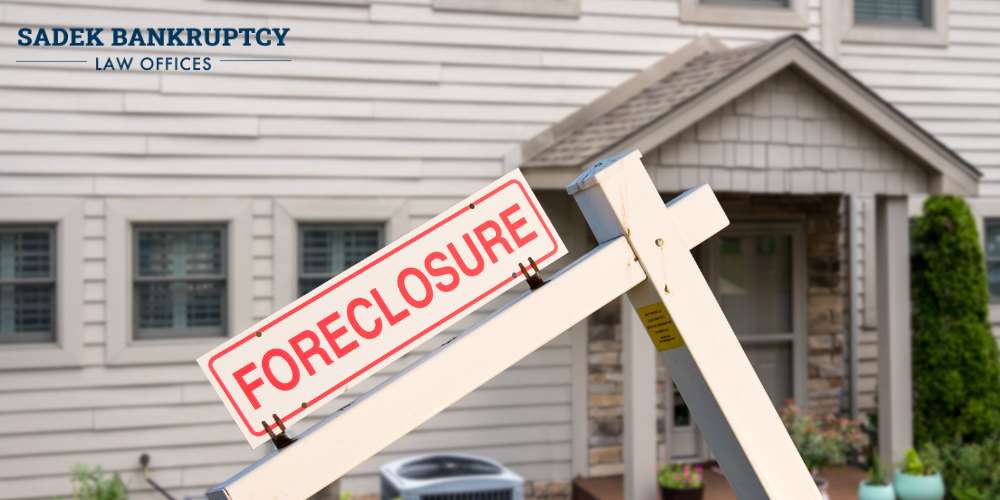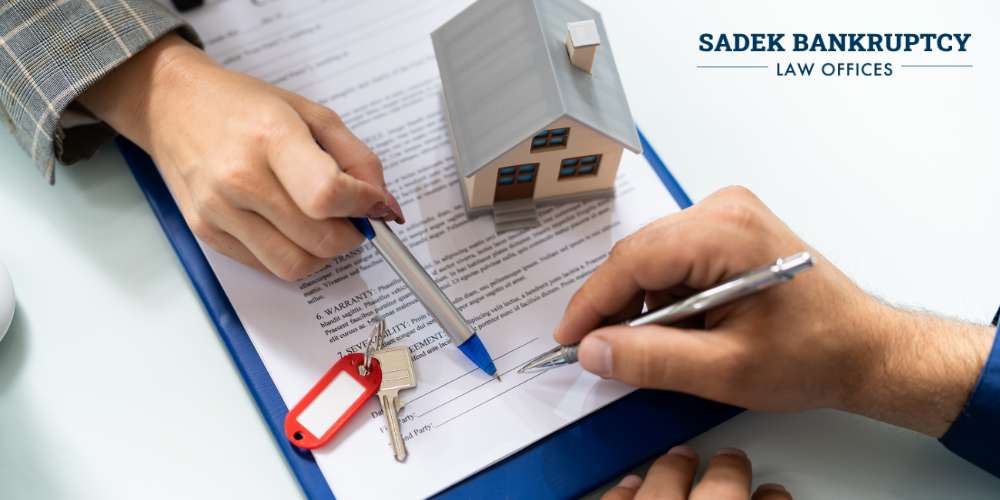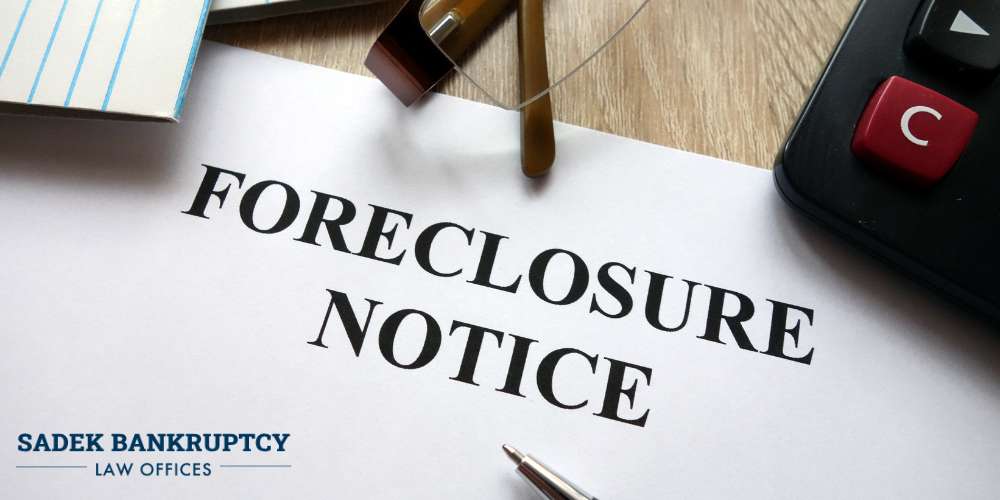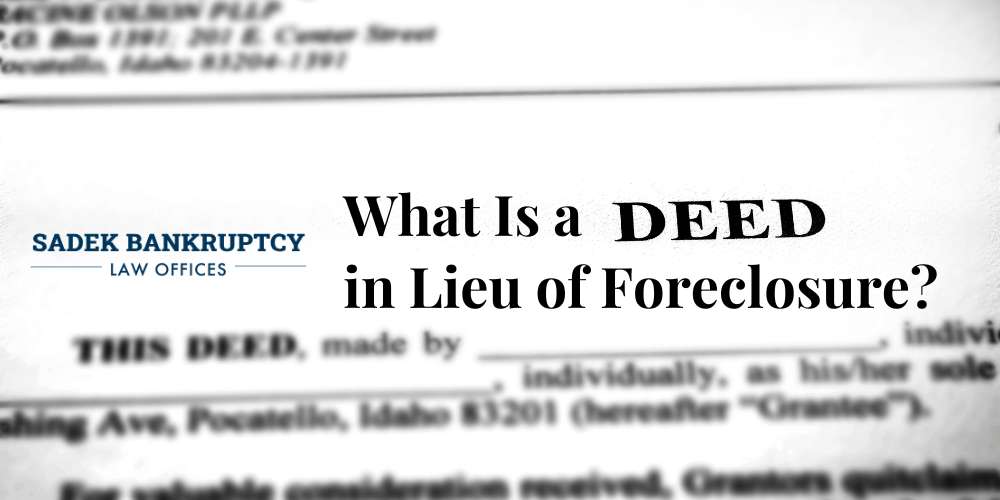Understanding a Deed in Lieu of Foreclosure in Pennsylvania
A deed in lieu of foreclosure is a loan term for homeowners seeking to avoid foreclosure. In this arrangement, many homeowners transfer ownership of the property to the lender voluntarily in exchange for being released from all mortgage obligations and any remaining balance.
This agreement must be entered into voluntarily and in good faith by both parties. The document is signed by the homeowner, notarized, and recorded in public records by the Federal Housing Administration.
In certain circumstances, the homeowner must give up their estate and move out, they are relieved of the mortgage debt. This process is usually less public than foreclosure, helping the homeowner who is facing foreclosure maintain privacy, reduce the embarrassment, and loss mitigation.
If you are facing foreclosure on your home, our Philadelphia foreclosure defense lawyers are here to help. The team at Sadek Bankruptcy Law Offices has extensive experience helping homeowners get their finances in order and save their homes. To learn more about your options, please call our office at 215-545-0008 today.
What Is a Deed in Lieu of Foreclosure?
A deed in lieu is a document that transfers the title of a property from the owner to their lender in exchange for relief from the debt. This option is often chosen by homeowners as a means of avoiding foreclosure, as it can be less financially damaging than going through a full foreclosure proceeding.
Typically considered a last resort, a deed in lieu of foreclosure is pursued when the property owner has exhausted all other options, such as a loan modification or a short sale. This process benefits both parties by allowing them to avoid time-consuming and costly foreclosure sale proceedings.
Deed in Lieu vs Foreclosure

Deed in lieu and foreclosure may sound similar, but they are not the same at all. In a foreclosure, the lender agrees to reclaim the property after the homeowner fails to make payments. Foreclosure laws vary by state and can occur in two ways: judicial foreclosure, where the lender files a lawsuit to reclaim the property, and nonjudicial foreclosure, where the lender can foreclose without court involvement.
The primary differences between a deed in lieu and a foreclosure involve their impacts on credit scores and financial responsibilities after the lender reclaims the estate. A foreclosure on your credit history can be more damaging than a deed in lieu, with both foreclosures and other negative information remaining on credit reports for up to seven years.
When you release the deed on a home back to the lender through a deed in lieu, the lender typically releases you from all further financial obligations. This means you no longer have to make mortgage payments or pay off the remaining loan balance. In contrast, with a foreclosure, the lender may take additional steps to recover the remaining debt or legal fees.
Deed in Lieu vs Voluntary Foreclosure
Your lender must follow the proper legal procedures to reclaim the property quickly through foreclosure, which can have significant drawbacks for you. For example, foreclosure will damage your credit score and remain on your credit report for seven years, making it extremely difficult to buy another home unless you can pay cash for keys.
Your lender may or may not offer you a financial incentive to vacate the property if it goes into foreclosure.
Foreclosure is a lengthy and costly process for both you and the lender. It is crucial to carefully consider all your options before agreeing to surrender the deed instrument to your home. In many cases, restructuring your mortgage loan is more beneficial for both parties than pursuing foreclosure.
Before deciding on a deed in lieu or foreclosure, consult a foreclosure defense attorney who specializes in foreclosures, such as those at Sadek Bankruptcy Law Offices.
Why Might a Mortgage Lender Reject a Deed in Lieu?
It’s important to remember that your lender is not obligated to accept a deed in lieu agreement. Several reasons might lead a lender to reject such an agreement. If your home’s fair market value has decreased and you owe more than it’s worth, they might require you to pay the difference between the appraised value and the amount owed.
If there are judgments or secondary existing liens on your property, the process becomes more complicated, as these are claims made by parties other than the lender. Some lenders might work with you to clear these outstanding liens if they see someone else has a claim on the property. Lastly, if your home is in poor condition, the lender could reject any deed in lieu agreement you propose.
Why Might a Mortgage Lender Accept a Deed in Lieu?
Though a lender isn’t obligated to accept your deed in lieu of foreclosure, they have several incentives to do so. Accepting a deed in lieu allows lenders to gain control over the property faster, avoiding the need to pay attorneys and go to court to prove non-payment and obtain approval to take the property.
The mortgage lenders must legally evict you from the property even after court proceedings, so a deed in lieu saves both time and money. Furthermore, many lenders prefer properties in good condition because they sell for more money and spend less time on the market. As a result, lender money might require you to maintain the property’s condition as part of the deed in lieu agreement.
Advantages and Disadvantages of a Deed in Lieu

A deed in lieu of foreclosure offers advantages for both borrowers and lenders, primarily by avoiding the lengthy, time-consuming, and costly foreclosure process. Borrowers benefit from potentially avoiding public notoriety, as the process can be handled more discreetly. Because the terms of vacating the property are mutually agreed upon, borrowers avoid the distress of an official eviction, which can occur with a foreclosure agreement.
In some cases, borrowers may even negotiate an agreement to lease the property back from the lender for a certain period. For lenders, the main advantage is saving money by avoiding the expenses associated with prolonged foreclosure proceedings.
However, lenders must evaluate the potential risks, such as the property’s value being less than the remaining mortgage balance and the presence of junior creditor liens on the property.
The significant downside of a deed in lieu of foreclosure is the impact on the borrower’s credit. This can result in higher borrowing costs and more difficulty obtaining future mortgages. While borrowers can dispute a foreclosure on their credit report with credit bureaus, there is no guarantee of its removal.
Pros of a Deed in Lieu
Minimizing the Deficiency Balance
Changing this amount to be smaller helps close the gap between your mortgage balance and the property’s value.
Possible Moving Assistance
Bringing in a lender allows help in the moving process as well as providing more privacy in the situation.
Less Credit Damage
A deed in lieu, like a foreclosure, will affect your credit score. However, it will impact it far less than a foreclosure.
Cons of a Deed in Lieu
No Guarantee of Acceptance
In order for you to complete a deed in lieu of foreclosure, the application must be approved and accepted. There is no way to absolutely guarantee this decision, but having a foreclosure attorney can help substantially.
Loss of the Home
This process does result in the loss of your home for both the lender and mortgage company to possess and resell. However, this process would affect you the least and save you time and money.
Negative Credit Impact
This type of foreclosure will bring your credit score down 60-125 points which is still significantly less than a regular foreclosure which could bring it down by up to 160 points.
Potential Taxes Owed on Forgiven Mortgage Debt
There may still be taxes owed on the debt which can be costly. This is another reason why it is important to have an experienced bankruptcy and foreclosure attorney like Sadek Law Offices to deal with any taxable income or pay stubs and avoid litigation further. Any tax liens or bank statements with the lieu deed can be fixed with a repayment plan with profitable tax returns.
What Happens When You Do a Deed in Lieu of Foreclosure?

A deed in lieu of foreclosure is a mutual agreement between a borrower and their lender where the borrower transfers ownership of the property to the lender if they are unable to meet their mortgage obligations. Instead of going through foreclosure proceedings, the borrower surrenders ownership of the property to the financial institution.
Deed in Lieu of Foreclosure Process
A lender may choose to offer a deed in lieu when a borrower defaults on their loan payments and both parties agree to avoid foreclosure. Borrowers eligible for a deed in lieu generally have three post-transaction options: they can move out of the home immediately, enter into a three-month transition lease without paying rent, or opt for a twelve-month lease and pay rent at the market rate. It is advisable for borrowers to seek guidance from a real estate attorney and broker who can assist in navigating the process.
How to Recover from a Deed in Lieu of Foreclosure
A deed in lieu of foreclosure can help you in your financial recovery by possibly eliminating deficiency judgments, which is the gap between your mortgage balance and the property’s value. By willingly transferring the deed to your lender and maintaining the home’s condition, your lender might agree to forgive or reduce this deficiency. If it is poorly maintained in specific circumstances, you could lose deficiency.
If the home sells for less than what you owe after the lender takes possession, you won’t be responsible for the difference.
Does a Deed in Lieu Affect Credit?
A deed in lieu of foreclosure can appear on your credit report and potentially lower your credit score. This could impact your eligibility for future mortgages, depending on the lender and mortgage product you apply for. When you transfer the deed, the lender removes the property lien and assumes ownership of your home.
Deed in Lieu of Foreclosure Credit Impact
In lieu of foreclosure, your credit score may drop by a range of 50-125 points after the deed is processed. This is still less severe than an actual foreclosure which can drop your score by 160, making this option more popular.
Will I Owe Money After a Deed in Lieu of Foreclosure?
A deed in lieu signifies a mutual agreement between you and your lender acknowledging your inability to continue making monthly payments. By transferring the property to the lender in a cooperative manner, both parties agree to avoid foreclosure. In return, the lender releases you from all obligations tied to the mortgage.
How to Avoid a Deed in Lieu of Foreclosure If You Fall Behind on Mortgage Payments

Loan Modifications
If you’re struggling with mortgage payments but want to keep your home, consider a loan modification. This involves your lender adjusting your mortgage interest rate to current market levels. If you owe more than your home’s value, your lender might place the excess principal into forbearance. During forbearance, this amount doesn’t accrue interest, helping to prevent further debt.
However, like a deed in lieu agreement, many mortgage lenders aren’t obligated to approve these options instead of foreclosure. Collaborate closely with your lender to find a solution that works for both parties.
Short Sales
If a loan modification isn’t feasible or you prefer not to remain in your home, a short sale could be an option. In a short sale, you sell your home for less than the remaining mortgage balance, typically due to decreased property values in the area. During this legal process, you engage with potential buyers, showcase your home, and work with real estate agents as in a standard sale. However, unlike a regular sale, your lender must approve the home’s sale price before it can proceed.
After a short sale, you may still owe money if there’s a deficient balance between your remaining loan amount and the sale price of your home. In such cases, your lender may pursue legal action to obtain a deficiency judgment against you. To avoid this, you can negotiate with your lender to waive their right to pursue deficiency claims. Note that some states, like California, have laws prohibiting deficiencies after a short sale.
Filing for Bankruptcy
Chapter 7 bankruptcy eliminates your financial debts, including your mortgage, but there’s a risk of losing your house. In contrast, Chapter 13 bankruptcy focuses on reorganization, allowing you to catch up on payments by incorporating them into a structured plan.
Contact a Philadelphia Bankruptcy and Foreclosure Attorney at Sadek Law Today
Deciding to opt for a deed in lieu of foreclosure can be daunting, but it offers a viable path for homeowners facing financial distress. At Sadek Bankruptcy Law Offices, we are committed to guiding our clients through this process with expertise and compassion. Our experienced team in Pennsylvania understands the nuances of foreclosure laws and strives to provide personalized solutions that safeguard your interests.
If you’re considering a deed in lieu of foreclosure or exploring other options, contact Sadek Bankruptcy Law Offices for a consultation. We’re here to help you regain your financial stability and peace of mind.





